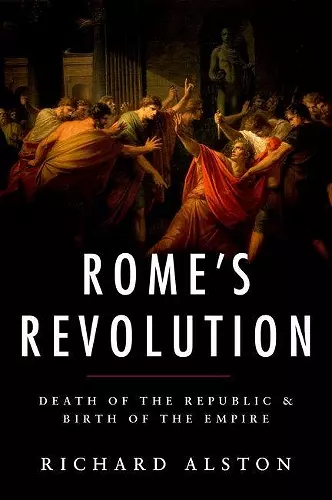Rome's Revolution
Death of the Republic and Birth of the Empire
Format:Paperback
Publisher:Oxford University Press Inc
Published:6th Jul '17
Currently unavailable, and unfortunately no date known when it will be back

Novelized, televised, and endlessly scrutinized by scholars, the fall of the Roman Republic marks one of history's great turning points. Historians have studied the descent of the Republic into civil war as a great political tragedy, a warning from the past about the unsustainability of empires; political scientists have labeled it a parable about militarism, populism, moral decay, or the inevitable corruption of political systems. Yet the familiar story of the Roman Republic's downfall continues to be the story of its elites. What if we started thinking about Roman politics not from the perspectives of Caesar and Cicero, but from the point of view of the soldier, the peasant, or the pauper? In an original account of what he calls Rome's revolution, Richard Alston reinscribes these humble protagonists into their tumultuous era. They, like the ruthless aristocrats they swore allegiance to, were political agents, negotiating their positions in the context of a "failed state." Rome's Revolution blends riveting historical narrative with socio-economic analysis, restoring a rich context to the cataclysmic violence of the period. In addition to chronicling the drama of aristocratic rivalries, the book digs beneath the high politics of Cicero, Caesar, Antony and Octavian to examine the problems of making a living in first-century BC Italy. Portraying the revolution as the crisis of a violent society--both among the citizenry and among a ruling class whose legitimacy was dwindling--Rome's Revolution provides new insight into the motivations that drove men to march on their capital city and slaughter their compatriots.
[A] vigorous, swift-paced account of events.... [P]articularly strong at describing the military campaigns leading to crucial battles. * History Today *
Alston carefully deconstructs the myths Romans held about their own origins and political values, breaking down the narratives about civilization and democracy to show the messy inner workings of an ancient system built on hierarchy and violence...a strikingly poignant examination of the dangers in self-aggrandizing myths of national glory, and the ways in which efforts to return to a non-existent past can push a state further from their supposed values. * Briedy Heing, The Daily Beast *
This book, written in straightforward, accessible English, is recommended as a knowledgeable guide to, and with a fresh 'take' on, an enthralling period of Roman history. * Antony Spawforth, Classics for All *
In Rome's Revolution, Richard Alston presents an excellent, concise survey of the key period of Roman history from the fall of the Republic to the rise of the Empire. He also reminds us that, however much politics and oratory influenced these years, it was violence that ultimately changed Rome. * Philip Freeman, author of Alexander the Great and Julius Caesar *
A skillfully woven portrait of the establishment of the Roman principate, dyed in much blood. * Tom Holland, author of Rubicon and In the Shadow of the Sword *
With violence and bloodshed at its very heart, Rome's Revolution will take readers out of their historical comfort zone. Richard Alston sets out to elucidate the messy nature of Roman history and to reject the utility of the concepts of consensus, settlements, and so on that have dominated the study of ancient history for more than a generation. * Ray Laurence, author (with Alex Butterworth) of Pompeii: The Living City *
ISBN: 9780190663469
Dimensions: 234mm x 157mm x 20mm
Weight: 544g
408 pages